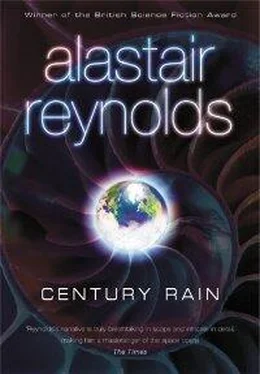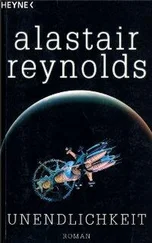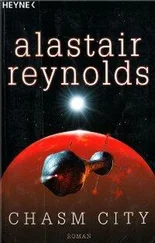“I just need some leeway,” Floyd said.
“You always need leeway,” she said. “That’s your problem. If money is the issue, I have some spare. Not enough for a ticket, but enough if you sold that car and whatever else you could stand not to take with you.”
“How long afterwards? I mean, after she…” Floyd trailed off, unable to come out and say it. “You mentioned a week to ten days.”
“I’d need a week or so afterwards to deal with the funeral. That gives you at least two weeks, maybe longer.”
“I’d worry about Custine.”
“Give him the business. God knows, he’s worked hard enough to deserve it.”
She had, Floyd thought, obviously given the matter some consideration herself. He imagined her working out the details on the train as she journeyed up from the south, and he felt both flattered and irritated to have been the subject of so much undeserved attention.
“Why are you giving me this second chance?” he asked.
“Because there’s still some part of me in love with you,” she said. “In love with what you could be, if you stopped living in the past. You’re a good man, Floyd. I know that. But you’re going nowhere here, and if I stick with you here then I’m going nowhere either. And that’s not good enough for me. But in America things could be different.”
“Is that true? That you still love me?”
“You wouldn’t have come to the station if you didn’t feel the same way about me. You could have ignored that letter, pretended it never arrived or that it arrived too late.”
“I could have,” Floyd admitted.
“Then why didn’t you? For the same reason I wrote to you—because as much grief and heartache as we cause each other when we’re together, it’s worse when we’re apart. I wanted to be over you, Floyd. I kidded myself that I was. But I wasn’t strong enough.”
“You’re not over me, but you’ll leave me anyway if I don’t agree to come to America with you?”
“It’s the only way. It’s either be together, or not be on the same continent.”
“I need some time to think about it,” Floyd said.
“Like I said, you have a couple of weeks. Shouldn’t that be enough?”
“A week or a year, I don’t think it’d make much difference.”
“Then don’t agonise over it,” Greta said. She moved closer to him, holding his hand tightly and snuggling her head against his shoulder. “I grew up in this room,” she said. “It was the centre of my universe. I can’t believe how small and dark it seems now, how terribly sad and adult it makes me feel.” Her grip on his hand tightened. “I was happy here, Floyd, as happy as any girl in Paris, and now all it makes me feel is that I’m a good way through my life and there’s a lot less of it ahead now than when I was last here.”
“It gets us all in the end,” Floyd said. “Growing up, I mean.”
She slid closer to him, until he could smell her hair; not just the perfume from the last time she had washed it, but the accumulated smells of the arduous journey she had made today: the smoke and the grit and the odour of other people, and, buried in there somewhere, something of Paris.
“Oh, Floyd,” she breathed. “I wish it wasn’t happening like this. I wish there was some other way. But when she’s gone, I don’t want to spend a minute longer in this city than necessary. There’ll be too many sad memories, too many ghosts, and I don’t think I want to spend the rest of my life feeling haunted by them.”
“You shouldn’t,” Floyd said. “And you’re right to make this move. Go to America. You’ll knock them out.”
“Oh, I’m definitely going,” she said, “but I won’t be truly happy unless you come with me. Think about it, Floyd, will you? Think about it like you’ve never thought about anything in your life. It could be your chance as much as mine.”
“I’ll think about it,” Floyd said. “Just don’t expect an answer before morning.”
He thought about making love to her—he had been thinking about it since the moment he opened her letter. He had little doubt that she would let him, if he tried. He also had little doubt that what she most wanted from him was to be held close, until, emotionally and physically drained, she fell into a shallow and uneasy sleep. She muttered things in German that he didn’t understand, imprecations that sounded urgent but which might have meant nothing at all, and then gradually she fell silent.
At three in the morning, he eased her into the bed, pulled the covers over her and walked out into the rain, leaving her alone in the room where she had grown up.
Auger found it uncomfortable to be alone in the same room as Thomas Caliskan, as if she had wandered into an obscene and sticky trap. He was a very thin man with a neatly groomed sweep of collar-length silver hair brushed back from an aristocratic forehead. He favoured costumes of silk and crushed velvet with long-tailed jackets, elaborate and carefully anachronistic. He wore owlish spectacles of blue-tinted glass. He often closed his eyes while speaking, as if attending to some very distant, very quiet melody, and when he moved his body, his head seemed momentarily reluctant to follow, as if anchored to a particular point in space and time.
“Do you mind if I continue playing for a moment? I find a little finger exercise focuses the mind wonderfully.”
“They say the same thing about execution.”
“Have a seat, Verity.”
Auger sat down. The chair was a chaise longue upholstered in dimpled green velvet. She suspected it was exactly as authentic and valuable as it appeared.
In front of the chaise longue was a small coffee table, upon which rested a flat, square object with an elaborate printed design on it. While Caliskan resumed his playing, Auger picked up the object, recognising it as the cardboard—processed wood pulp—sleeve for a gramophone recording. There was something inside it. She tilted the sleeve, letting the recording slip into her fingers. It was a thin black disc made of a heavy plastic-like material, engraved on both sides with a complex spiral pattern.
The disc was typical of millions that had been manufactured between the ends of the nineteenth and twentieth centuries. It was pressed from shellac, which she recalled was some kind of insect-derived resin. The spiral grooves contained encoded sounds designed to be read by a diamond-tipped stylus as the disc was spun at a few dozen rotations per minute. The playback caused a steady deterioration in the quality of the recording, as the stylus wore away the grooves and embedded tiny particles of grit in the disc itself. Even the original recording had been captured by a chain of analogue processes, each of which introduced random structure into the sound.
But it was also a true analogue artefact, and therefore of immense historical value. A recording stored in the volatile memory array of a computer system could be erased or doctored in an eyeblink, and the evidence trail artfully concealed. A recording like the shellac disc could be destroyed, but it could not easily be altered. Forgery was equally difficult, due to the complex chemical make-up of the disc and its packaging. When such items survived to the present day, therefore, they were regarded as extremely reliable windows on the historical past, pre-Nanocaust, pre-Forgetting.
Auger examined the label, reading that the disc contained music by the composer Mahler: Das Lied von der Erde. Auger knew very little about composers in general, and even less about Mahler in particular. All that she remembered was that he had died well before the beginning of her period of interest.
Caliskan stopped playing and returned the viola and bow to their stand. He watched her studying the disc and asked, “Intrigued?”
Читать дальше












